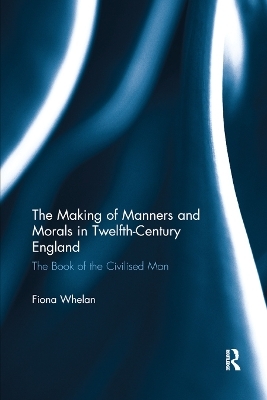
The Making of Manners and Morals in Twelfth-Century England
Routledge (Verlag)
978-0-367-89004-9 (ISBN)
- Titel z.Zt. nicht lieferbar
- Versandkostenfrei
- Auch auf Rechnung
- Artikel merken
How different are we from those in the past? Or, how different do we think we are from those in the past? Medieval people were more dirty and unhygienic than us – as novels, TV, and film would have us believe – but how much truth is there in this notion? This book seeks to challenge some of these preconceptions by examining medieval society through rules of conduct, and specifically through the lens of a medieval Latin text entitled The Book of the Civilised Man – or Urbanus magnus – which is attributed to Daniel of Beccles.
Urbanus magnus is a twelfth-century poem of almost 3,000 lines which comprehensively surveys the day-to-day life of medieval society, including issues such as moral behaviour, friendship, marriage, hospitality, table manners, and diet. Currently, it is a neglected source for the social and cultural history of daily life in medieval England, but by incorporating modern ideas of disgust and taboo, and merging anthropology, sociology, and archaeology with history, this book aims to bring it to the fore, and to show that medieval people did have standards of behaviour. Although they may seem remote to modern ‘civilised’ people, there is both continuity and change in human behaviour throughout the centuries.
Fiona Whelan completed her DPhil in Medieval History at the University of Oxford in 2015, and has previously studied at Trinity College Dublin and University College London. She has published on manuscript dissemination and has contributed to the collection Transformations and Continuities in the Eleventh Century: The Archaeology of the Norman Conquest. She currently works for the University of Oxford and her research interests include the cultivation of norms of behaviour, food and diet in the medieval period, household administration, and the manuscript culture of early courtesy literature.
Illustrations
Acknowledgements
Abbreviations
Manuscript Sigla
Introduction
Chapter 1. The Background to Urbanus Magnus
Content
Introduction to the Manuscripts
Composition
Authorship
Chapter 2. Genre and Urbanus Magnus
Scholarship on Urbanus Magnus
The Genre of Courtesy Literature
The Origins of Courtesy Literature
Other Sources
Chapter 3. The Manuscript Evidence
Twelfth-Century Satire
An Educational Tool
Religious Use
A Medical Text
Chapter 4. Introduction to Themes
Chapter 5. The Medieval Household and Beyond
Administering the Household
Householder, Home, and Hospitality
Children and Wives
Staff and Servants
Outside the Household
Social Mobility and Appropriate Courtesy
Chapter 6. The Medieval Body in Urbanus Magnus
Bodily Moderation and Restraint
Speech and Laughter
Bodily Vices
The Body and Sex
Bodily Emissions
Disgust
Chapter 7. Medieval Dining and Diet
The Archaeological Evidence
The Medieval Meal
Preparation and Consumption
Manners
Continuity and Change
Diet and Health
Chapter 8. New Interpretations
The Impetus for and Precursors to Urbanus Magnus
Origins
Social Habitus
The Court of Henry II
‘A Monument to Anxiety’
Use
The Impact of Urbanus Magnus
Conclusion
Appendix: Contenances de table poems
Bibliography
Index
| Erscheinungsdatum | 16.12.2019 |
|---|---|
| Verlagsort | London |
| Sprache | englisch |
| Maße | 156 x 234 mm |
| Gewicht | 380 g |
| Themenwelt | Geschichte ► Allgemeine Geschichte ► Mittelalter |
| Geisteswissenschaften ► Geschichte ► Regional- / Ländergeschichte | |
| Geschichte ► Teilgebiete der Geschichte ► Kulturgeschichte | |
| ISBN-10 | 0-367-89004-6 / 0367890046 |
| ISBN-13 | 978-0-367-89004-9 / 9780367890049 |
| Zustand | Neuware |
| Haben Sie eine Frage zum Produkt? |
aus dem Bereich


